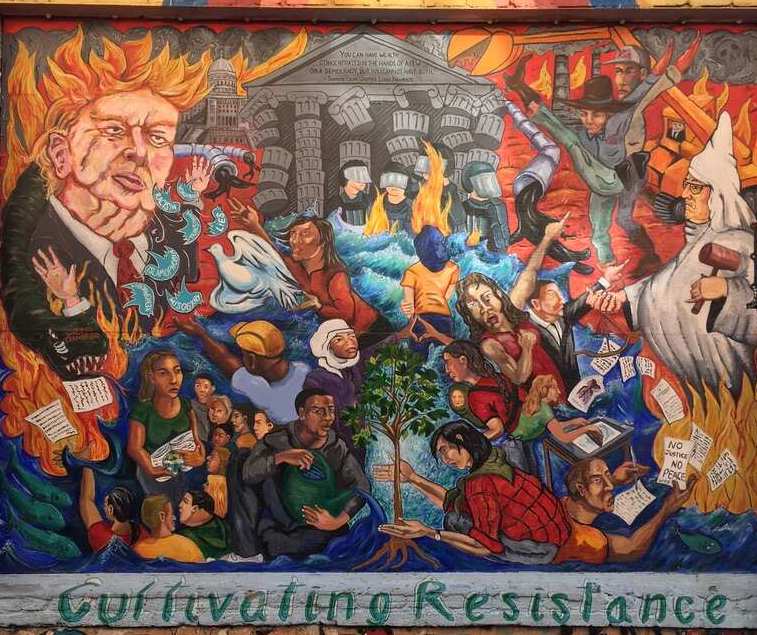“Teflon Don” describes our ex-president perfectly: he’s artificial, toxic to our system, and despite the best efforts of our prosecutors, incredibly slippery to convict.
Why has Donald Trump been able to avoid serious legal trouble for decades? His lies and crimes seem palm-to-forehead obvious to most Americans:
- The self-described pussy-grabber has been accused of sexual assault by two dozen women.
- He publicly asked Russia to hack Hillary’s computer in July 2016, soliciting the help of a foreign government to win an election
- He’s screwed over countless contractors in his business dealings.
- He defrauded his own charity.
- He asked Georgia Secretary of State Brad Raffensperger to “find 11,780 votes”—one of many targeted attempts to overturn the results of the 2020 presidential election.
- He inflated the value of the Trump Organization’s assets to secure a loan, and deflated it when calculating his tax liability.
- He incited an insurrection against the U.S. Capitol on January 6, 2021 based on his Big Lie.
- He stole top secret documents from the White House, including intelligence secrets and nuclear information, which he refused several times to return.
And many, many more.
Before Trump became a politician, he was relatively shielded from legal consequences by his wealth, which could buy the most ruthless lawyers. Now, it’s even harder to pin down Teflon Don for another reason: indicting a former president would hurt our national pride.
When Richard Nixon was forced to resign for the adorable crime of orchestrating a break-in on the DNC Headquarters, he was pardoned immediately. It was unconscionable for the most powerful man in our country to face legal repercussions. Also, American presidents are generally reluctant or unwilling to admit errors. (President Obama was an exception, and he was excoriated by right-wingers for “humiliating a superpower” with his apologies.)
It’s assumed that taking basic accountability will make the United States appear weak or unstable in the eyes of the world. In other words, we are crippled by our own arrogance and self-righteousness. Similarly, has Trump ever sincerely apologized for anything?
In this vein, there’s a less-discussed undercurrent of fear in prosecuting Trump. Bringing this former president to justice would expose the darkest parts of our national consciousness. He embodies the worst of the American character: unfettered greed, entitlement, dishonesty masked with a smile, toxic ambition, aggression, racism, hubris. If we arrest him, it would be an indictment of our country’s ugliest tendencies and dealings with the world.
Here’s the thing:
- Like Trump’s ruthless attempts to overturn the 2020 presidential election, the United States has helped overthrow democratically elected leaders in Iran (1953), Guatemala (1954), Brazil (1964), Chile (1973), Venezuela (2002), Haiti (2004), Egypt (2013), and others to consolidate its own power and interests.
- Like Trump and his father’s racist refusal to rent their properties to Black tenants in the 1960s and beyond, the United States has a long history of segregation and redlining baked into its land usage.
- Like Trump’s repeated insistence that “executive privilege” shields him from any legal consequences, the United States assumes that its “exceptionalism” allows it to get away with actions other countries can’t.
Are we strong enough to turn that scrutiny inward? To admit that winning at all costs isn’t a healthy inclination? To acknowledge that like Trump, the United States has screwed over a lot of people?

There are varied reasons why some Americans are against indicting Trump. One argument is that not all crimes are prosecuted in the interest of “preserving domestic tranquility and institutional integrity.” Another states that prosecuting Trump would set a dangerous precedent, where the non-ruling party would target their opponents relentlessly in the White House. (I’d argue that this already happens.) Still others say prosecuting Trump will make him into a martyr and “there will be riots in the streets!”
These are all valid concerns but taken together, they don’t outweigh the importance of preserving our legal system’s integrity—letting a powerful person get away with so many obvious crimes sets a dangerous precedent.
Many of Trump’s own cronies have been indicted or imprisoned for acting on his behalf: Michael Cohen, Paul Manafort, Rick Gates, Michael Flynn, Roger Stone, Elliott Broidy, George Papadopoulos, Steve Bannon, and Allen Weisselberg, not to mention the growing tally of Trump superfans who are now in prison for the January 6 Insurrection.
Is it just a coincidence that Trump pals around with so many accused and convicted criminals?
The United States needs to swallow its pride and do what’s right: bringing a powerful criminal to justice takes more strength than cowing to threats of violence and division. The rest of the world is watching, and they will cheer in the streets when Trump faces the consequences of his crimes.
Let’s show them that we’ve grown and matured, that we are worthy of being the international stewards and role models we have always imagined ourselves to be.

Well laid out argument. Agree 100%